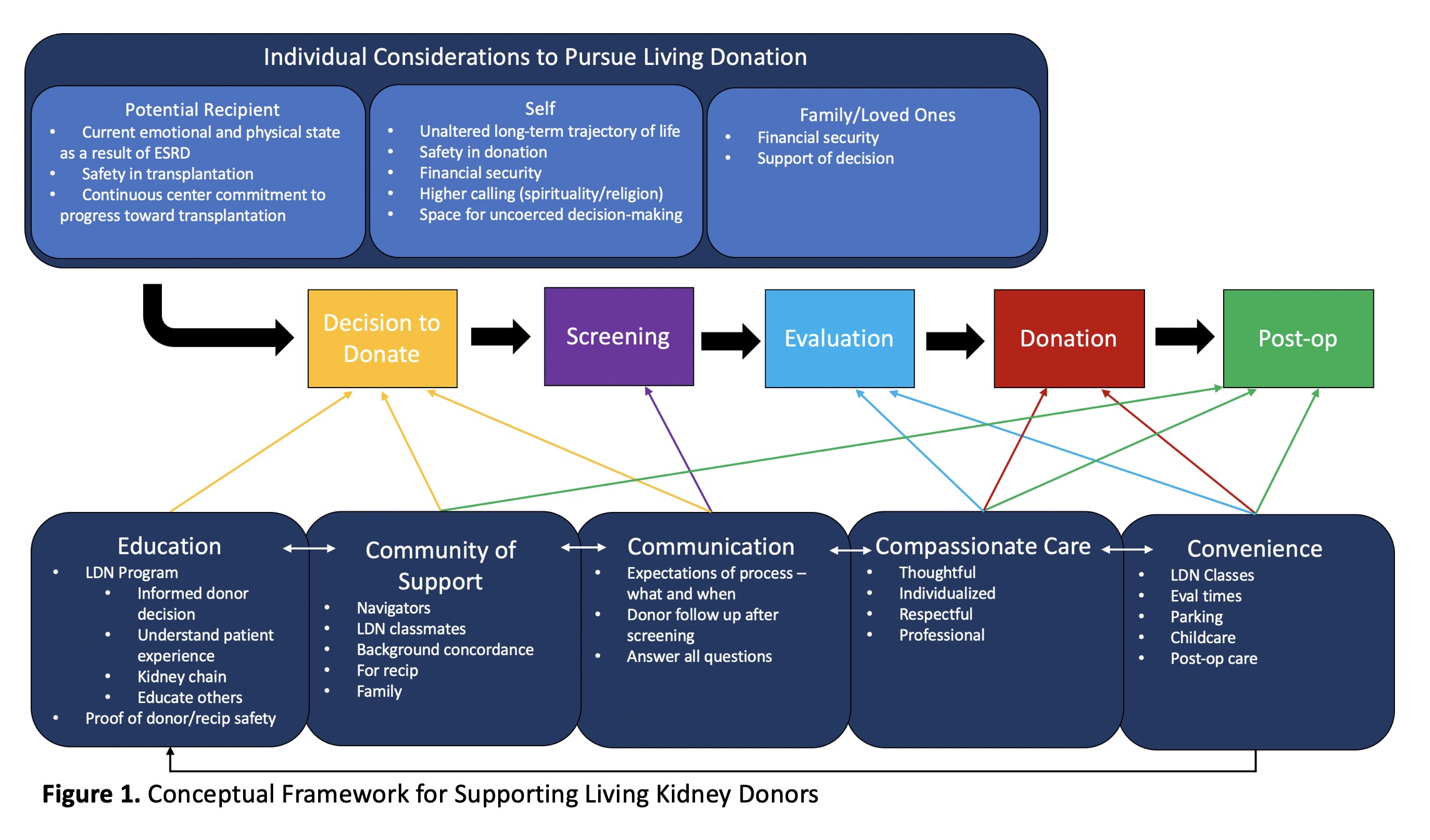A Conceptual Framework for Supporting Living Kidney Donors Throughout the Donation Process
University of Alabama at Birmingham, Birmingham, AL
Meeting: 2022 American Transplant Congress
Abstract number: 1052
Keywords: Donation, Living donor, Quality of life
Topic: Clinical Science » Kidney » 40 - Kidney Living Donor: Other
Session Information
Session Time: 7:00pm-8:00pm
 Presentation Time: 7:00pm-8:00pm
Presentation Time: 7:00pm-8:00pm
Location: Hynes Halls C & D
*Purpose: The majority of programs aimed to increase living donor kidney transplantation (LDKT) address transplant candidates’ needs, not those of potential donors. The Living Donor Navigator (LDN) Program simultaneously addresses candidate concerns by training friends or family to advocate on the candidate’s behalf, and donor concerns using lay navigators to increase comfort throughout the donation process. The purpose of this analysis was to explore the ways in which a program can attend to potential donors’ needs and help them progress toward living kidney donation.
*Methods: Donors screened on behalf of candidates who participated in the LDN program 04/2017-01/2020 were purposively sampled. Individual interviews were conducted virtually among 7 participants, audio recorded, and transcribed verbatim. Concepts pertaining to the central question (How can a program like the LDN Program help potential donors progress on their journeys to living kidney donation while respecting their values, honoring who they are, and meeting them where they are at?) were extracted for use in thematic analyses performed using an inductive approach.
*Results: Of the 7 participants, 43% had completed the donation process, and 71% also served as advocates in the LDN program. The majority were female (86%), white (57%), younger than 51 years old (57%), and lived more than 1 hour driving distance from the transplant center (57%). Education levels ranged from high school to doctoral degrees. Six themes emerged in our analyses: one pertained to the priorities that guided participants’ decisions to pursue living kidney donation, while five characterized differing, though interrelated ways in which LDKT programs can address potential donors’ concerns and increase comfort during the donation process. Figure 1 depicts a conceptual framework of the relationships between the themes of Individual Considerations to Pursue Living Donation, Education, Community of Support, Communication, Compassionate Care, and Convenience as they relate to the stepwise process of living kidney donation.
*Conclusions: The resultant conceptual framework describes potential donors’ considerations and priorities in the decision to become a living kidney donor, and highlights opportunities for programmatic intervention to support potential donors throughout the evaluation and donation process. This framework will not only serve as the foundation for LDN Program refinement, but may also guide future program development nationally to better serve potential living kidney donors.
To cite this abstract in AMA style:
Killian C, Qu H, Reed R, Woods C, Owens G, Carter A, Kumar V, Hanaway MJ, Herbey I, Ivankova N, Shewchuk R, Locke J. A Conceptual Framework for Supporting Living Kidney Donors Throughout the Donation Process [abstract]. Am J Transplant. 2022; 22 (suppl 3). https://atcmeetingabstracts.com/abstract/a-conceptual-framework-for-supporting-living-kidney-donors-throughout-the-donation-process/. Accessed February 15, 2026.« Back to 2022 American Transplant Congress

